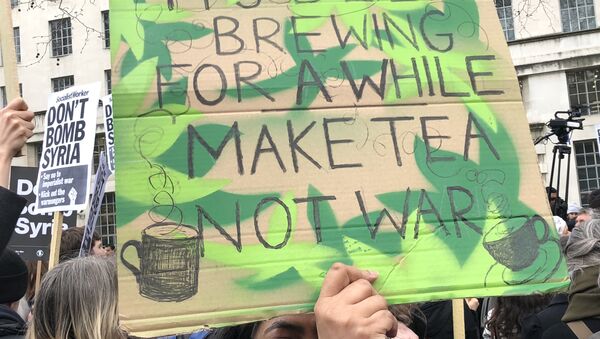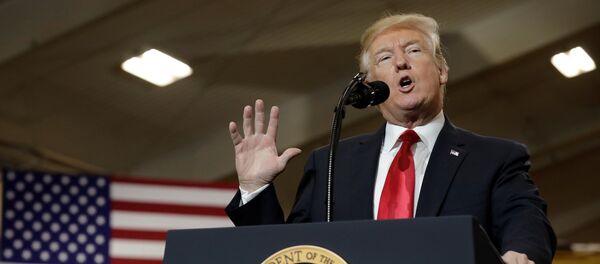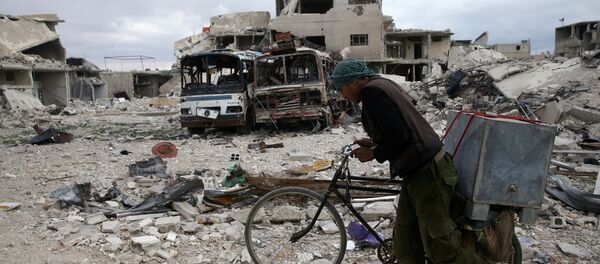Sputnik: US President Donald Trump's pledge to fire "smart" missiles on Syria apparently indicates that a ghost of last year's missile strike on the Arab country is already in the air. What’s your take on that?
Alexander Gillespie: I think the risk of a missile strike is "more than in the air." Mr. Trump almost has to act as if he does not, he will run the risk of doing exactly what Mr. Obama did – of not following up on threats of "red lines." He also needs to act because he will want to look tough in the forthcoming negotiations with North Korea.
Mr. Macron in France faces a similar problem – he too has promised that chemical weapons are a red line issue for him in Syria – and he now says he has proof that an attack occurred. If the US and France act, it is likely that the UK will join them, as their relationship is tight, especially in light of their shared responses to the Skripal incident. It is possible that Israel could also be involved.
Sputnik: What are your thoughts on the recent comment made by Trump? What consequences can it have?
Alexander Gillespie: It’s not so much the consequences of the action of Mr Trump, but the reactions by Mr. Putin. Specifically, if Mr. Putin is willing to let American [and its allies’] missiles rain down on Syria and not respond, this will all go away after a few dozen deaths.
If he is not willing to let them rain down and responds by going after the launch platforms – the planes, warships, submarines – or even the American troops in Syria – then we are at the absolute cusp of a third world war.
READ MORE: White House 'Confident' Syrian President Assad Behind Douma 'Chemical Attack'
Mr. Putin’s position is complicated by two facts. One, he is tired of Russia bearing the brunt of Western actions recently – irrespective of the merits of these actions. Second, Russia is linked by a treaty to cooperate on matters of defense.
Although it does not mandate action, Russia has consistently taken a forthright interpretation to help the Assad regime in this area – especially in the fight for the integrity of the country.
Whether Mr. Putin will now take this approach with another wave of foreign missile attacks is unknown – although the warnings appear to be very clear from Russia: do not strike Syria, or we will strike back. Apart from Russia not being known for making idle threats, it seems that Mr. Putin may have now set his own red line.
Sputnik: Russia noted that a missile strike by the US can destroy all evidence of chemical weapons used in Syria. Do you think this the main aim of the US?
Alexander Gillespie: No. The evidence of chemical weapons use is not just in the land and buildings, it is also in the blood and tissue of the victims.
Sputnik: Russia has stated that it would shoot down US missiles fired over Syria. Can this lead to a possible US-Russia confrontation?
Alexander Gillespie: If the missiles, alone, are shot down – no, not a confrontation; if the platforms that they are launched from – yes – a confrontation.
Having said that, even expecting Russia to tolerate their ally being attacked and turning a blind eye to the provocation, is an extreme risk.
The entire situation is a powder keg, and the risk of it exploding – if the missile strikes are launched – is high.
READ MORE: WATCH Douma Doctor Blow Lid Off White Helmets' 'Chemical Attack' Claims
It should not be like this. All sides need to calm down and use the international machinery that exists to prevent conflicts like Syria escalating to a regional, if not a global, conflict. This means working within the Security Council and the Chemical Weapons Convention.
America should promise not to strike – if the inspectors from the Chemical Weapons Convention can gain access – and crucially – attribute blame. Russia should promise to allow both [access and attribution] aspects.
Once the evidence is in, the matter should go back to the Security Council. Russia is a much greater influence inside Syria than America, and it needs to police it – Syria – to a much higher degree, so that the outside world can have confidence in Russian control.
Sputnik: US allies such as the UK, Australia and France have stated that they will consider a missile strike on Syria. What can we expect from US western allies?
Alexander Gillespie: I think it’s more likely to be the UK, France and the US. Maybe Israel. The risk is not that a few dozen missiles hit Syria, but a counter-response from Russia provokes a quick firing escalation that rapidly spirals out of control. If one American ship is hit by one Russian missile – irrespective of the fact that the American ship fired first – the third world war could ignite very quickly.
Sputnik: Do you think it’s still likely that the US troops will withdraw from Syria in the short term?
Alexander Gillespie: In an ideal world, Mr. Trump knows what he is doing, and this is all some kind of game to get an actual peace deal, acceptable to all of the main player in Syria, and taking out American troops could be part of that deal. This is not an ideal world.




